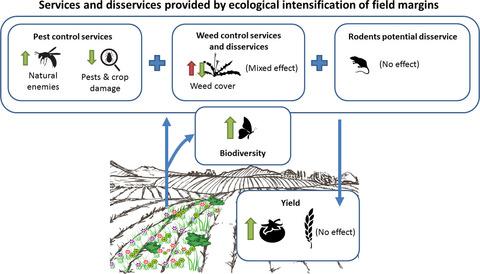当前位置:
X-MOL 学术
›
J. Appl. Ecol.
›
论文详情
Our official English website, www.x-mol.net, welcomes your feedback! (Note: you will need to create a separate account there.)
Experimental evidence of multiple ecosystem services and disservices provided by ecological intensification in Mediterranean agro‐ecosystems
Journal of Applied Ecology ( IF 5.7 ) Pub Date : 2020-07-06 , DOI: 10.1111/1365-2664.13713 Hila Segre 1 , Michal Segoli 2 , Yohay Carmel 3 , Assaf Shwartz 1
中文翻译:

地中海农业生态系统中生态集约化提供的多种生态系统服务和损害的实验证据
更新日期:2020-07-06
Journal of Applied Ecology ( IF 5.7 ) Pub Date : 2020-07-06 , DOI: 10.1111/1365-2664.13713 Hila Segre 1 , Michal Segoli 2 , Yohay Carmel 3 , Assaf Shwartz 1
Affiliation

|
- Intensifying agricultural production in sustainable ways is pivotal to increasing food production while reducing environmental impacts. Ecological intensification is based on managing organisms that provide services underlying crop production to simultaneously intensify agricultural production and increase biodiversity. However, few studies address the interactions and trade‐offs between biodiversity, multiple ecosystem services and crop production.
- We experimentally quantified the effect of uncultivated field margins, a prominent practice of ecological intensification, on agricultural production, biodiversity, as well as on multiple ecosystem services and disservices, in an intensive Mediterranean agro‐ecosystem. We used a split‐plot design and sampled butterflies, rodent and arthropod pests, arthropod natural enemies (both parasitoids and predators), weeds, damage to crop and crop yield in different distances into the field in 3 tomato and 11 wheat crops along the growing season.
- Field margins increased natural enemy densities, reduced pest‐damage to crop and consequently increased yield in tomato crops. Notably, we found that pest control by one predator species was dominant in the field centre, whereas parasitoid natural enemies were confined to the field edges. Pest control was more prominent in the late crop‐stage compared to early season sampling and field margins increased weed control in tomato crops by reducing weed cover.
- Field margins increased natural enemy densities in wheat at the beginning of the season, but effects on arthropod pests were inconsistent. Field margins slightly increased weed cover, but had no impact on rodent densities and total yield.
- Butterfly abundance, but not richness, was positively affected by vegetated field margins.
- Synthesis and applications. Promoting ecological intensification requires a holistic approach that considers the complex relationships among ecological and economic aspects of agro‐ecosystems. We found that ecologically intensified field margins provided pest and weed control in the highly intensive tomato crop, yet they increased weed cover in wheat, which could potentially restrict yields at the field scale. Farmers' guidelines should therefore consider the interactive effects of multiple services on a variety of crops. Moreover, biodiversity components that do not provide crop production services should be independently targeted (e.g. by sowing plants that provide food resources).
中文翻译:

地中海农业生态系统中生态集约化提供的多种生态系统服务和损害的实验证据
- 以可持续的方式加强农业生产对于增加粮食产量同时减少对环境的影响至关重要。生态集约化基于对提供作物生产基础服务的生物进行管理,以同时集约化农业生产和增加生物多样性。但是,很少有研究涉及生物多样性,多种生态系统服务和作物生产之间的相互作用和权衡。
- 我们通过实验量化了集约化的地中海农业生态系统中未耕作的田间边缘,生态集约化的一种重要实践对农业生产,生物多样性以及多种生态系统服务和损害的影响。我们使用了分块设计,对蝴蝶,啮齿动物和节肢动物害虫,节肢动物天敌(寄生虫和天敌),杂草,作物的伤害和作物产量的不同距离采样,分别沿生长的3种番茄和11种小麦作物进入田间季节。
- 田间边缘增加了天敌的密度,减少了对农作物的害虫危害,因此增加了番茄作物的产量。值得注意的是,我们发现一种捕食动物对害虫的控制在田间中心占主导地位,而寄生类天敌则局限于田间边缘。与早季采样相比,害虫防治在作物后期更为突出,田间利润通过减少杂草覆盖提高了对番茄作物的杂草控制。
- 季初,田间边缘增加了小麦的天敌密度,但对节肢动物害虫的影响不一致。田间边缘略微增加了杂草覆盖率,但对啮齿动物密度和总产量没有影响。
- 植被丰满的边缘对蝴蝶的丰度(而不是丰度)产生了积极的影响。
- 综合与应用。促进生态集约化需要采取整体方法,考虑农业生态系统的生态和经济方面之间的复杂关系。我们发现,生态高度集约化的田间边缘可为高度集约化的番茄作物提供害虫和杂草控制,但它们增加了小麦的杂草覆盖率,这可能会限制田间规模的产量。因此,农民指南应考虑多种服务对多种农作物的互动影响。此外,不提供作物生产服务的生物多样性组成部分应独立确定目标(例如,播种提供粮食资源的植物)。



























 京公网安备 11010802027423号
京公网安备 11010802027423号